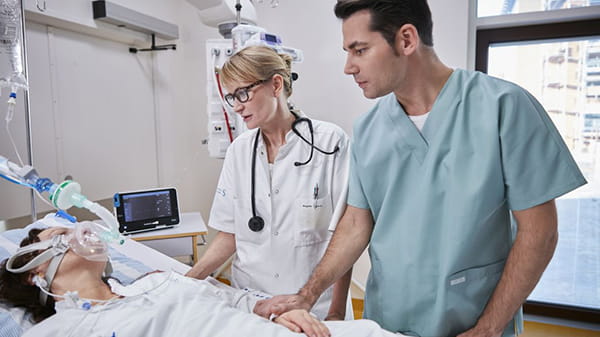
About Radiometer
Empowering caregivers to make diagnostic decisions to improve patient care
Whatever comes next, we make sure life comes first
Their goal is to improve patient care.
Our goal is to help them.
We are a medical device company. We develop products and solutions that provide health care professionals with the critical information they need in acute care diagnostics.
Our diverse community of colleagues share a common identity, mindset and purpose—to empower caregivers to make diagnostic decisions to improve patient care.
Because for us, answering what’s next in health care starts with what comes first—life.
Click here to renew consent


Who we are and what we believe in
We pioneered the blood gas market in 1954 and continue to develop our extensive knowledge and experience in acute care diagnostics.
Our promise to put life first unites us and drives us to work for and with our customers to answer what comes next in health care.
Across professional backgrounds, job positions and locations, we work to address today’s challenges and tomorrow’s opportunities.
Our mission and vision
Specialists by blood


Our commitment to customers
Since developing the world’s first commercially available blood gas analyser in 1954, we have continuously advanced our acute care diagnostic solutions with dedication, clinical evidence, attention to detail, and heartfelt passion.
Together we bring reliable, connected solutions to critical care settings around the world.
The innovation and improvement of our products and solutions come from the passion and persistence of our associates. We believe that great ideas and results come from associates who are inspired to grow.
Our leadership
In the news


Our commitment to our people
“Best team wins” is our mantra and shines through in the way we work together and with our customers.
Every associate plays an important role in the company and fulfilling our shared purpose is dependent on a united effort. A united effort of more than 3,500 associates in Radiometer and more than 80,000 associates across Danaher.
A diverse team is essential to our growth and the understanding of our customers and the markets we serve at Radiometer.
The diversity of our organisation begins with talent recruitment and ends with unique performance and career plans.
Our associates comprise 68 different nationalities speaking 63 different languages. Their unique perspectives are the reason we can continue to meet customer needs and bring new and innovative solutions to market. Their success is our success and we truly are better together.
Radiometer is proud to be part of Danaher
Danaher's science and technology leadership puts Radiometer's solutions at the forefront of the industry, so they can reach more people. Being part of Danaher means we can offer unparalleled breadth and depth of expertise and solutions to our customers.
Together with Danaher's other businesses across Biotechnology, Diagnostics and Life Sciences, we unlock the transformative potential of cutting-edge science and technology to improve billions of lives every day.
Join us
Our commitment to sustainability
Our commitment to integrity, compliance and legal obligations
Integrity and compliance
Legal
Cookies are used on this website
Use of cookiesPlease enter a valid email
We will be sending an e-mail invitation to you shortly to sign in using Microsoft Azure AD.
It seems that your e-mail is not registered with us
Please click "Get started" in the e-mail to complete the registration process
Radiometer is using Microsoft AZURE Active Directory to authenticate users
Radiometer uses Azure AD to provide our customers and partners secure access to documents, resources, and other services on our customer portal.
If your organization is already using Azure AD you can use the same credentials to access Radiometer's customer portal.
Key benefits
- Allow the use of existing Active Directory credentials
- Single-sign on experience
- Use same credentials to access future services
Request access
You will receive an invitation to access our services via e-mail when your request has been approved.
When you accept the invitation, and your organization is already using AZURE AD, you can use the same credentials to access Radiometer's customer portal. Otherwise, a one-time password will be sent via e-mail to sign in.
